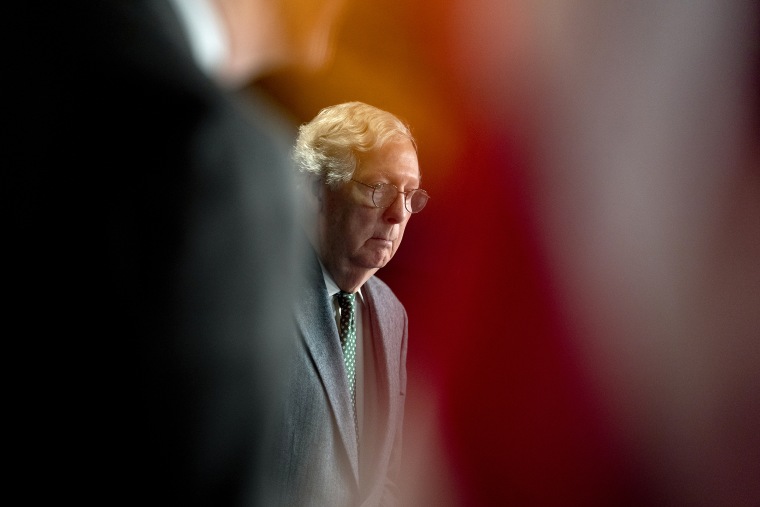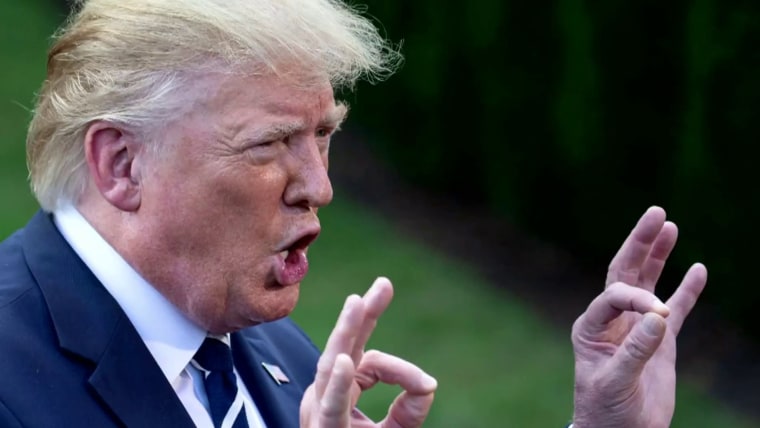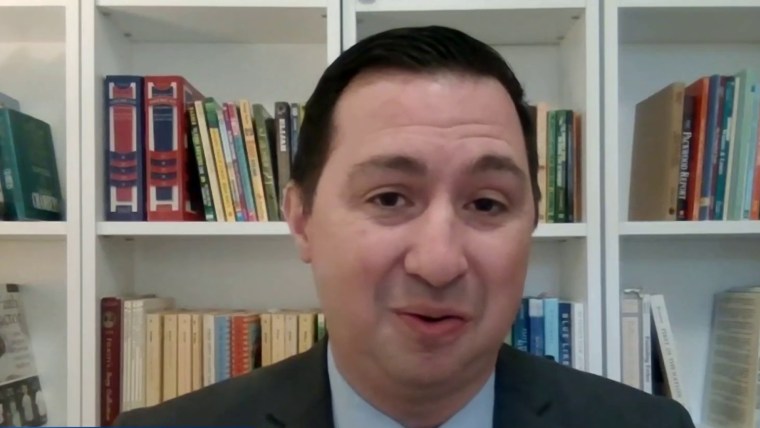SKIP TO CONTENT
McConnell is battling Trump for loyalty of Senate GOP

WASHINGTON — Senate Minority Leader Mitch McConnell, R-Ky., is waging a quiet campaign to keep his caucus from getting a whole lot Trumpier after the midterms.
"He wants people who he knows are team players, people who are interested in solutions," said a GOP senator who spoke on the condition of anonymity to avoid angering fellow Republicans. "There are a lot of people who are running for office these days who have different agendas."
In Alaska's Senate race, McConnell is backing incumbent Republican Lisa Murkowski, who voted to convict former President Donald Trump on impeachment charges last year. She faces a Trump-backed challenge from Kelly Tshibaka.
In Arizona, McConnell is trying to recruit Gov. Doug Ducey, who angered Trump by refusing to overturn his state's electoral votes, to run in a Republican primary that already features multiple Trump-aligned hopefuls. Many Washington Republicans are concerned that the party could blow its chance to defeat Democratic Sen. Mark Kelly if it nominates a candidate who is seen as too extreme.
And over several conversations, McConnell privately lobbied his top lieutenant, Senate Minority Whip John Thune, R-S.D., to run for a fourth term rather than leave open a seat in South Dakota, which could easily nominate and elect a Trump-style Republican. Trump has issued an open call to Republicans in the state to run against Thune, and shortly after Thune announced that he would seek re-election, one of Trump's pollsters conducted a survey that suggested he could be vulnerable.
The power struggle between McConnell and Trump is one of the more consequential subplots of this midterm election season, and its outcome promises to affect not only which party controls the Senate next year but also whether the Senate GOP is more or less Trump-flavored a year from now. It occurs against the backdrop of a deep freeze between the two men, which set in when McConnell condemned the Jan. 6, 2021, attack on the U.S. Capitol and said Trump had "provoked" it.
Trump has taken to calling McConnell a "broken old crow."
McConnell's first priority is to take back the Senate majority. In some states, he finds himself aligned with Trump. For example, both men are supporting Republican Herschel Walker's bid to unseat Sen. Raphael Warnock, D-Ga. In other states, particularly a handful that could be competitive in the general election, neither man has endorsed any of the current candidates.
Their camps played down the idea of a clash of candidates, even at a time when tensions have been high.
"Which Senate candidates are not Trump-aligned and backed by McConnell?" Trump spokesman Taylor Budowich asked in a text message. Budowich didn't reply when the names of Murkowski and Thune were supplied.
John Ashbrook, a spokesman for McConnell, declined to comment for this article.
By talking up the shared goal of winning in November, many Republican lawmakers have found a safe space from which they can advocate for establishment candidates without directly attacking the Trump corps.
"The single most important thing when it comes to Republican primaries is to nominate people who can win," said Sen. John Cornyn, R-Texas.
But some Republicans readily point to what they say is a conflict of interest between McConnell and Trump that is apparent in races where there are more clear-cut choices between the wings of the party.
"McConnell is party line, which is true to form, that he wants a Republican majority," said a GOP strategist and former Senate aide who is sympathetic to McConnell's point of view. Trump "is less concerned with a majority and more concerned with a Trump-focused majority — I think he would be comfortable with a minority in the Senate if it were a Trump-loyal minority."
A bumper crop of senators loyal to Trump, rather than to the party or McConnell, could complicate McConnell's efforts to lead.
Already, he is losing reliable Republican allies such as Sens. Rob Portman of Ohio, Roy Blunt of Missouri, Pat Toomey of Pennsylvania, Richard Shelby of Alabama and Richard Burr of North Carolina to retirement.
Trump's endorsed candidate in Pennsylvania, Sean Parnell, dropped out amid domestic abuse allegations, an episode that appears to have made him more cautious about licensing his brand. Of the current set of candidates in those states, all of which feature competitive primaries, only Ted Budd of North Carolina, backed by Trump, has won an endorsement from either man.
There is bound to be more reluctance in races in which there are no clear front-runners and the party will have to unite after the primaries to win in November. That dynamic is at play in Pennsylvania and Ohio.
But where there's friction between Trump and McConnell, it isn't just about making sure the GOP can win. McConnell wants to limit Trump's influence once the election is over.
Trump has long encouraged Republican senators to oust McConnell from his leadership post, and two candidates, Tshibaka and Eric Greitens of Missouri, have vowed to vote for someone else if they are elected. While McConnell is safe — Senate leadership votes are taken by secret ballot, and colleagues widely view him as an effective leader — he wants to make sure that he can manage the Republican conference.
"That, he's interested in," the Republican senator said.
end quote from:
https://www.nbcnews.com/politics/politics-news/mcconnell-battling-trump-loyalty-senate-gop-n1287943



No comments:
Post a Comment